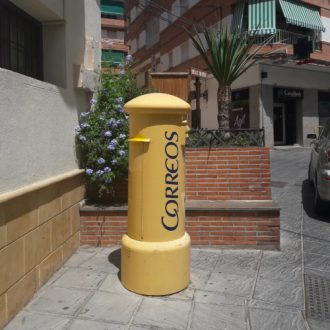How to: Travel on a Budget
Dear Simon,
We’ve certainly touched on different techniques for efficient, economical travel in the past but we we know this is a topic that is SO important to young and budget-conscious travelers that we’ve decided to compile some of our best tips here. Here at Sincerely, Spain we do not believe that you have to be rich to enjoy all of the wonders and discoveries that travel has to offer. On the contrary, there are many simple things you can do to keep your travel costs to a minimum (and perhaps your travel frequency to a maximum)! Here are our top sixteen tips:
Planning your trip
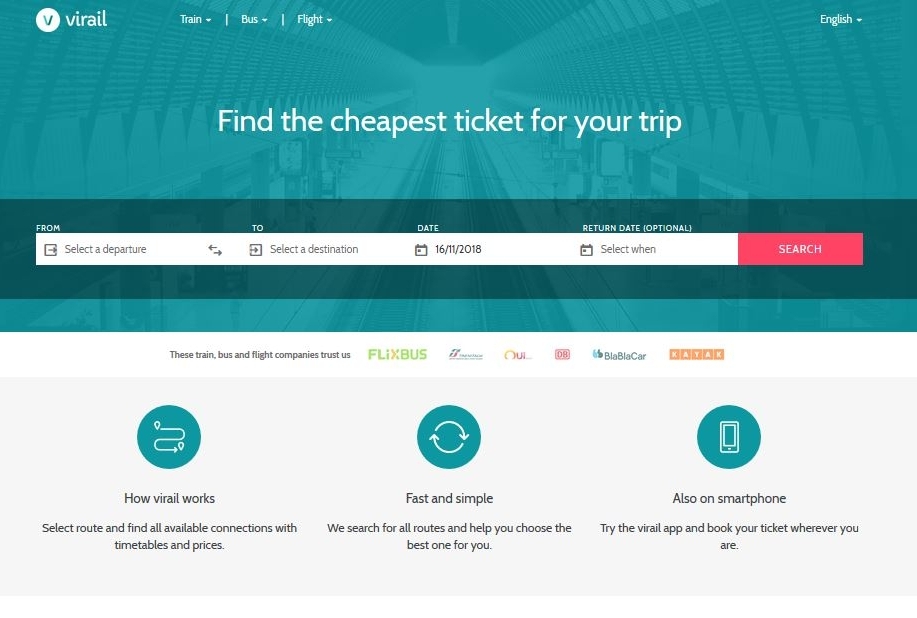 Saving money while traveling begins long before you reach your travel destination, consider the following tips that will help you keep your lodging and transport costs low:
Saving money while traveling begins long before you reach your travel destination, consider the following tips that will help you keep your lodging and transport costs low:
1.) Search on comparative sites like Omio, Virail, and Skyscanner: Use a search engine like these to compare a variety of transport options. In this way, you can see side-by-side what the time-to-cost ratios are of your different choices and make an informed decision of whether you want to fly or take a different form of transport. Skyscanner can be especially useful if you will be flying but haven’t nailed down a particular destination or travel date and are open to finding the cheapest option available (check out this article to learn more about finding cheap flights).
Pro-Tip: Even after using a search engine like those listed above, you may want to check a handful of different websites for the exact option you plan on going with. And note that, Oftentimes, the direct website of the airline, hotel, etc will have the best price.
2.) Take an overnight bus or train: These options tend to be longer and at ‘undesirable times’ but if you’re someone you can sleep on moving vehicles and/or are willing to plan your trip around the schedule you can often save money not only on your transport but also on your lodging as this will save you a night or two you’d otherwise stay somewhere. Keep in mind however, that if it is hard for you to sleep in new places or with people chatting around you that this might not be the best option to get a full nights sleep and arrive at your destination rested.
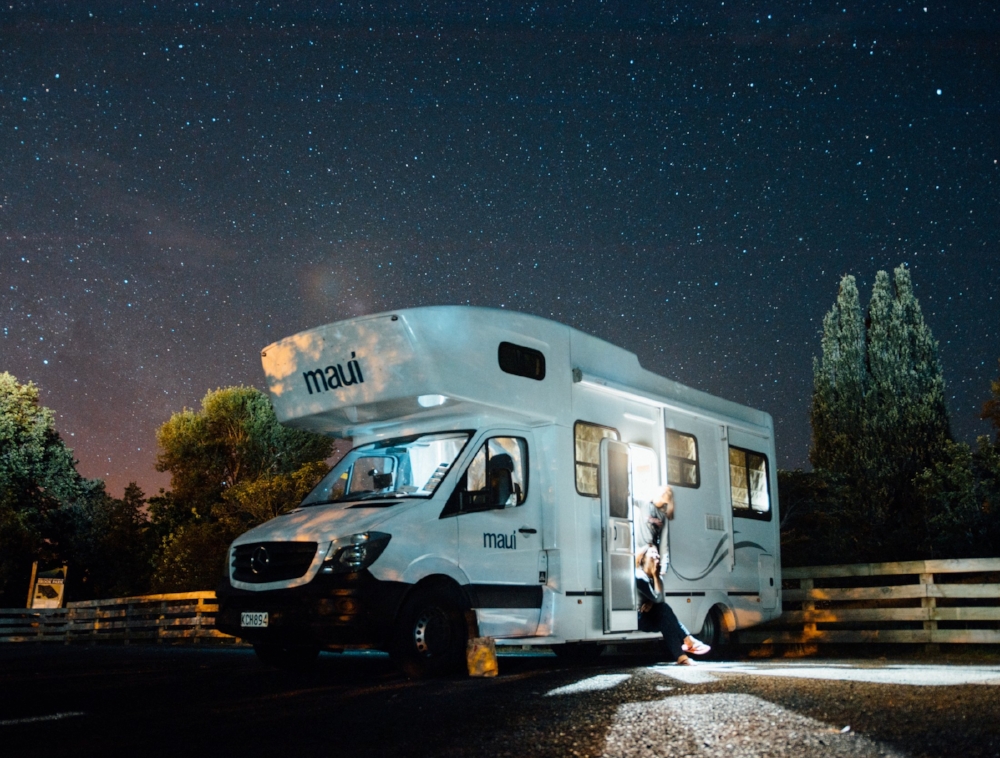 3.) Motorhome ‘rental’: If you have a flexible schedule and driver’s license you may have one more unconventional transport-lodging combination available to you. Occasionally, you can find motorhome ‘rentals’ that are really the owners of a motorhome advertising that they need someone to move their RV from one location to another. As you would be doing a favor to the owners as well, this is usually extremely affordable. Often, your fuel costs are even covered, provided you get their motorhome from point A to point B in good condition within the timeframe indicated in the ad.
3.) Motorhome ‘rental’: If you have a flexible schedule and driver’s license you may have one more unconventional transport-lodging combination available to you. Occasionally, you can find motorhome ‘rentals’ that are really the owners of a motorhome advertising that they need someone to move their RV from one location to another. As you would be doing a favor to the owners as well, this is usually extremely affordable. Often, your fuel costs are even covered, provided you get their motorhome from point A to point B in good condition within the timeframe indicated in the ad.
Pro-TiP: Wondering what one might do on an rv-trip through spain? the options are nearly endless—our friends at rv lifestyle have put together this very comprehensive list of 100 things to do in spain. check it out!
4.) Use Bla Bla Car: We’re already written tons about Bla Bla Car (such as how to use Bla Bla Car, how to choose the best Bla Bla Car, and how to be a good Bla Bla Car rider) so we won’t repeat ourselves but let’s just say this is a great option for (typically) saving money on your transport while often getting more convenient pick-up and drop-off locations and good conversation along the way. In addition, if you have a car and are looking to save money on gas, this could also be an option for you!
5.) Send Couchsurfing requests: We’ve also written a lot about Couchsurfing (such as how to make a Couchsurfing profile and how to use Couchsurfing as a guest) as it’s something we genuinely believe in and through which we have met amazing people. If you use Couchsurfing mindfully and respectful (try to make requests as far in advance as possible), most of the time you’ll easily find an amazing host which will eliminate all of your lodging costs while also likely saving you the need to pay for tours and other ‘local experiences’ as hosts are often happy to offer this to you out of the goodness of their hearts!
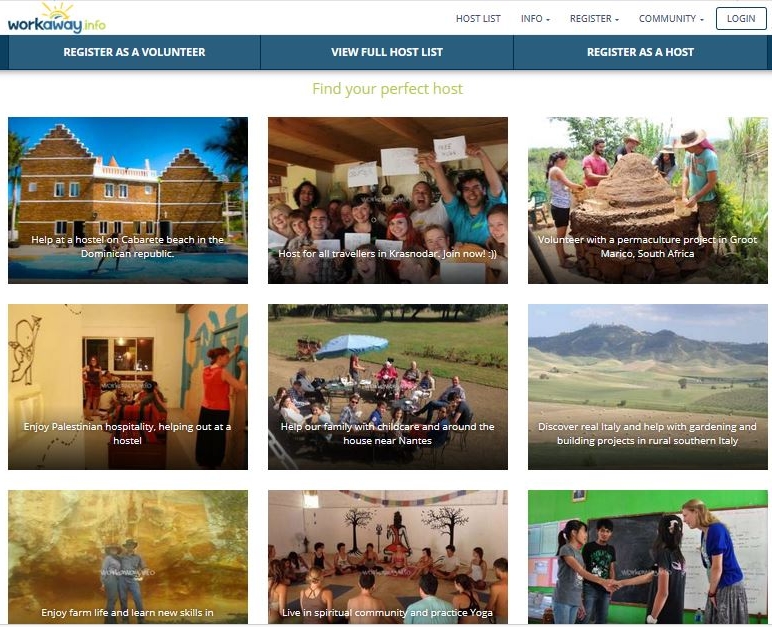 6.) Check out WorkAway or WOOFing options: Another budget travel option that has become popular is using sites such as WorkAway or WOOFing to find a host who is willing to lodge and feed you, provided you do some work around their house, farm, etc. There are all sorts of jobs needed so you can typically find one that fits your interests and needs. Simply be sure to weigh the pros and cons in terms of how many hours a day the host will need your assistance vs. how much time you’ll have to visit whatever destination you’re traveling to.
6.) Check out WorkAway or WOOFing options: Another budget travel option that has become popular is using sites such as WorkAway or WOOFing to find a host who is willing to lodge and feed you, provided you do some work around their house, farm, etc. There are all sorts of jobs needed so you can typically find one that fits your interests and needs. Simply be sure to weigh the pros and cons in terms of how many hours a day the host will need your assistance vs. how much time you’ll have to visit whatever destination you’re traveling to.
Note: Many hosts are not located directly in the city and may require a car or paying for transportation to get into the nearest city, also something to consider in your budget.
7.) Choose a hostel or AirBnB instead of hotel: Of course, if you’re not into the idea of or unable to get a host via one of the ways we have mentioned, choosing a hostel or AirBnB tends to be much more economical. This, of course, depends on the number of people you’re traveling with and the arrangements that you choose. For example, an AirBnB split between four people will almost always be more affordable than two hotel rooms. However, if you stay at a hostel but book a private room with a private bathroom, prices might be very similar to that of a hotel.
Pro-tip: In addition, if you stay at an AirBnB or hostel, it is usually pretty easy to make at least some of your meals at home, saving you more money. If this appeals to you, check out our top tips for making food while traveling here.
8.) Research special youth and/or student discounts: Especially in Europe, there are often many discounts or special passes available to young travelers but they are not always so well advertised. If you speak the language of the country you will be traveling in, be sure to check their original language website, not the translated version. Additionally, asking locals (either in person or through travel forums, sites like Tripadvisor, Facebook groups, etc) can help you discover options you didn’t know existed. For example, you might qualify for a great deal on a Eurail pass if you’ll be long-term traveling in Europe.
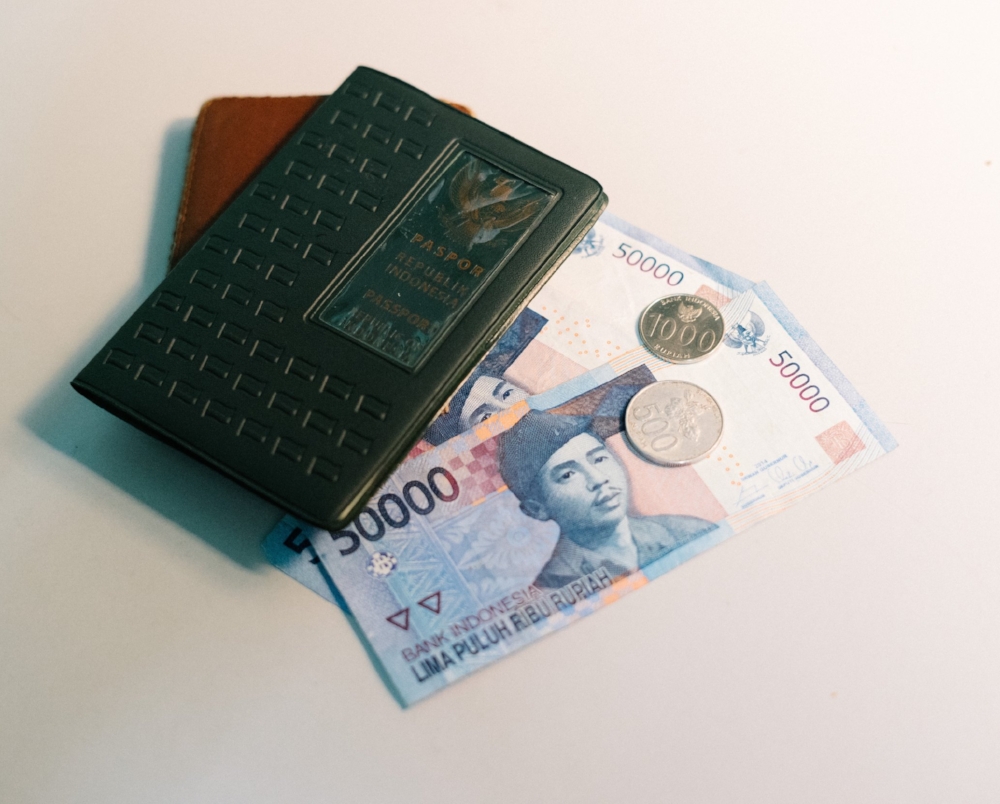 9.) Plan out how you’ll get the local currency before you go: If you’ll be traveling in a country with a different currency than you’re used to, it’s important to put some forethought into how you’ll have access to that currency on your trip. In many (but not all) cases, simply using your debit card at a local ATM will give you the best exchange rate and save you the hassle of going to a currency exchange before your trip. Additionally, this can help you travel smarter as it can be very risky to carry around all the money you plan on needing during your trip in cash. However, be sure to ask your bank as well as do some research about what cards are generally accepted where you will be traveling in order to avoid a financial disaster (i.e. in less touristic cities in Asia it can be difficult to find at ATM that takes Visa or Mastercard).
9.) Plan out how you’ll get the local currency before you go: If you’ll be traveling in a country with a different currency than you’re used to, it’s important to put some forethought into how you’ll have access to that currency on your trip. In many (but not all) cases, simply using your debit card at a local ATM will give you the best exchange rate and save you the hassle of going to a currency exchange before your trip. Additionally, this can help you travel smarter as it can be very risky to carry around all the money you plan on needing during your trip in cash. However, be sure to ask your bank as well as do some research about what cards are generally accepted where you will be traveling in order to avoid a financial disaster (i.e. in less touristic cities in Asia it can be difficult to find at ATM that takes Visa or Mastercard).
10.) Pack appropriately to avoid unnecessary added purchases: This is an ‘obvious one’ that so many people overlook. Have an idea about where you’re going, what the weather tends to be like, and what you’re planning to do there. If you think you’ll be hitting the beach, don’t forget your flip flop and if you think it will rain a lot, be sure to pack your own umbrella or raincoat. These are the little things you can plan ahead for that can save unnecessary purchases on your trips.
While on your trip
 Many of us feel there’s a long checklist of things we MUST see and do while visiting a certain destination and that visiting these things MUST cost us a decent amount of money. However that’s totally not true; try out these tips to cut down on costs without cutting down on your great experience:
Many of us feel there’s a long checklist of things we MUST see and do while visiting a certain destination and that visiting these things MUST cost us a decent amount of money. However that’s totally not true; try out these tips to cut down on costs without cutting down on your great experience:
1.) Schedule a free walking tour: Granted, you should always give a ‘tip’ to your tour guide even though the tour is called a free walking tour. However, these kinds of tours are worth just as much if not more than a paid tour and, especially when done at the beginning of your trip, can help you narrow down where you want to go later—while getting a local’s advice about which sites are the best bang for your buck.
Note: We recommend giving at least 5€ per person for a free walking tour. If you can manage to give more, great, but try not to use a service and give nothing!
2.) Seek out free attractions: Not everything worth seeing at your destination should require you to pay (in fact, we’d argue most of the true gems are free of cost)! Pay attention to the entrance fees of different attractions and plan accordingly. You may be able to see/do tons without shelling out any money or you may need to strategically choose just one or two paid attractions that you absolutely can’t pass up.
Pro-Tip: Often times, there is a certain day or time of day that is free for all or some museums and historical sites. Be sure to ask around about this as well as for any student or youth discounts!
 3.) Hit the supermarket: Whether you plan to cook all of your meals at your accommodations or mostly eat out, it’s a good idea to stock up on cheap but filling food options. Even if you want to eat out and try a lot of local dishes, stop into the supermarket to pick up healthy snacks you can carry with you like fruit and nuts as well as anything you’ll want to eat at home. And, if you do your shopping at local markets, you might even be able to try some local things that you might not have seen otherwise. Whenever possible, avoid corner stores in the very center of town as their overpricing can easily cancel out your good intentions. Asking a local where the best prices can be found is always helpful.
3.) Hit the supermarket: Whether you plan to cook all of your meals at your accommodations or mostly eat out, it’s a good idea to stock up on cheap but filling food options. Even if you want to eat out and try a lot of local dishes, stop into the supermarket to pick up healthy snacks you can carry with you like fruit and nuts as well as anything you’ll want to eat at home. And, if you do your shopping at local markets, you might even be able to try some local things that you might not have seen otherwise. Whenever possible, avoid corner stores in the very center of town as their overpricing can easily cancel out your good intentions. Asking a local where the best prices can be found is always helpful.
Pro-Tip: Bringing your own reusable water bottle is also recommended to keep you hydrated without needing to stop into corner stores every few hours to purchase a cold drink—better for your budget and the environment!
4.) Cook (at least some of) your meals ‘at home’: With the popularity of hostels and AirBnBs, it’s quite easy to have access to a kitchen and therefore save tons on your food costs. I highly recommend cooking at least one meal a day on your own if you’re looking to travel cheaply. We have an entire article about this, filled with good meal ideas! Not only is this a good way to save money but it can also help you form connections while staying in a hostel or with a Couchsurfing host.
5.) Walk whenever possible: One of the best parts about visiting a new place is getting to take it all in and what better way to do that than walking wherever you want to go? Although it may be much faster and more convenient to hop on the metro, it will obviously add up if you are paying to do this multiple times throughout the day. You also miss a lot of the charm by traveling underground, so consider cutting down on costs as well as the hustle and bustle by leisurely strolling to your destinations instead.
6.) Take the local bus instead of the tourist bus: When your destination truly is too far to walk, try to find a local bus line instead of the well-advertised tourist bus or shuttle to get you to that historical site. You might need to do some research (have we mentioned asking locals enough?), but this can easily save you money—just be sure you’re not on a tight schedule as local buses will have more stops in between and take you a bit longer.
Pro-Tip: If you notice there is no announcement or posting of the names of the stops (quite common on local buses) befriend a local rider or the bus driver and ask them to warn you when your stop is coming up.
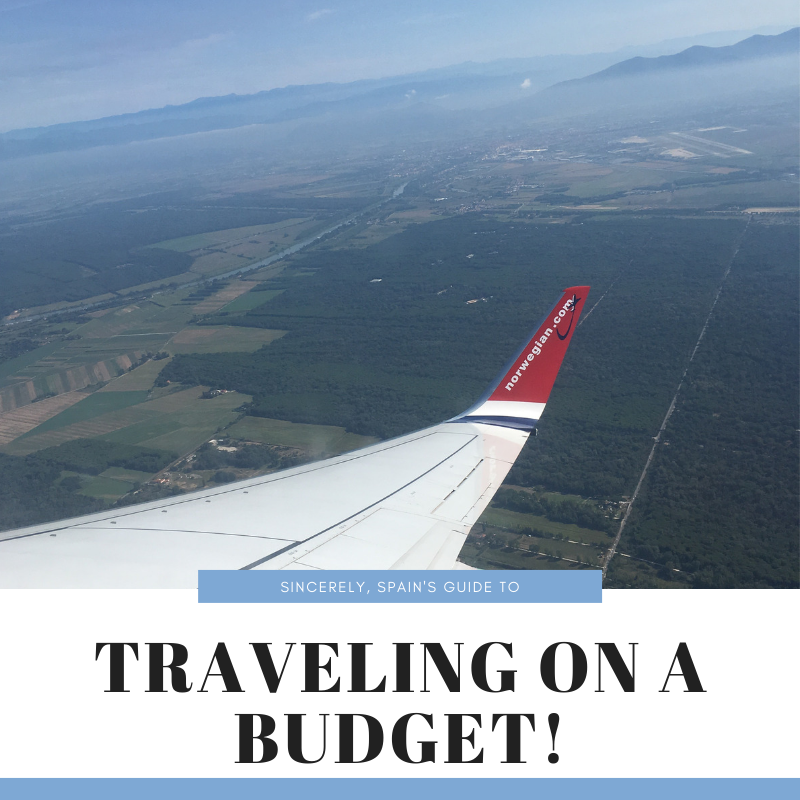 And there you have it! These are by no means the only things you can do to make your trip more affordable but they are some of our favorite ways of traveling on a budget. Additionally, many of them help you to integrate more into the local culture and perhaps get a more authentic experience than you would if you stuck to the typical guidebook recommendations. We hope they help you travel well while also traveling cheaply!
And there you have it! These are by no means the only things you can do to make your trip more affordable but they are some of our favorite ways of traveling on a budget. Additionally, many of them help you to integrate more into the local culture and perhaps get a more authentic experience than you would if you stuck to the typical guidebook recommendations. We hope they help you travel well while also traveling cheaply!
Let us know if these tips work out for you or if there’s something else you do to keep your travels economical.
Sincerely,
Spain


